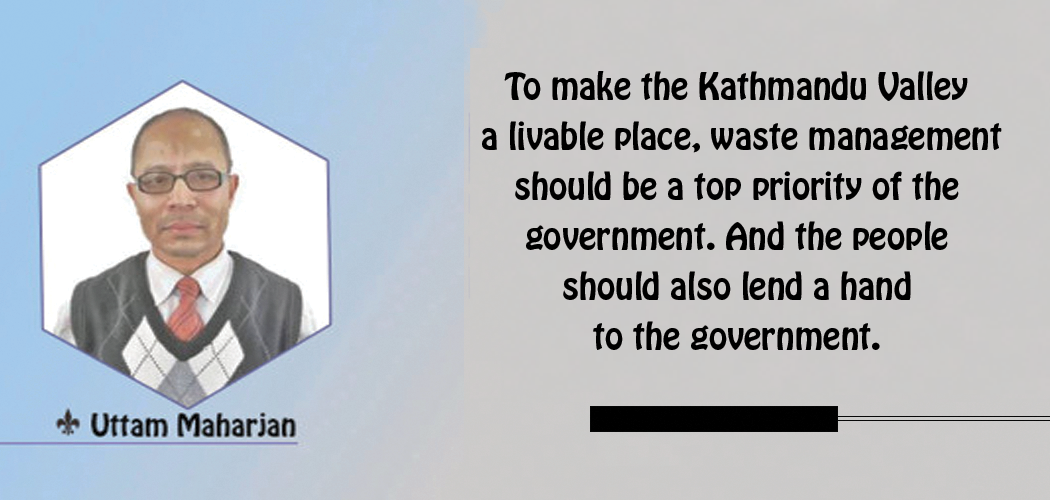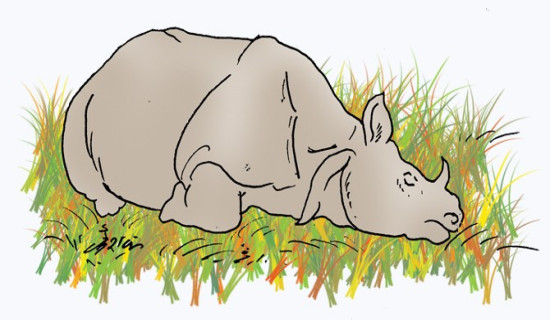- Wednesday, 7 January 2026
Proper Management Of Urban Waste
Uttam Maharjan
The Sisdol landfill site is full of waste now. Just before the local elections, some waste was dumped into the landfill site. There are many factors responsible for waste pile-ups in the Kathmandu Valley. One of them is obstructions by the locals living around landfill sites. There are also cases where the locals of Teku have obstructed the dumping of waste into the Teku waste station. Sometimes, even rain plays havoc with the dumping of waste. It is difficult for waste-carrying vehicles to reach the landfill site on rainy days.
Protest
The locals have been protesting against the dumping of waste into the Banchare Danda landfill site, demanding construction of the road to Banchare Danda, evacuation of settlements around the landfill site, their resettlement elsewhere, etc. The government selected Shailung-Aravali Infrapower JV as a contractor for the construction of the Balaju-Ranipauwa road section under the Road Improvement Project. But the contractor did not complete the project in time. That is why the locals have been obstructing the disposal of waste into the Banchare Danda landfill site.
Over 12 metric tons of waste is generated from the Kathmandu Valley on a daily basis. In 2005 AD, waste was dumped into Sisdol of Nuwakot on condition that the waste would be dumped there for three years only. But the Kathmandu Metropolitan City (KMC) did not look for alternatives. Waste was continued to be dumped into the landfill site till just recently, when it was full. The locals of Sisdol almost regularly resorted to protests as the KMC kept on dumping waste there for 17 years. During all these years, there were obstructions time and again.
The Department of Urban Development and Building Construction under the Ministry of Urban Development could not complete the construction of the Banchare Danda landfill site in time. There is an inordinate delay in completing the construction. However, one package of the landfill site has been completed, while the other part is still under construction. Despite the completion of the construction of one package of the landfill site, the KMC was dillydallying in using the landfill site. After pressure from various quarters as the waste was piling up day after day, the KMC was forced to use the landfill site.
However, it was not easy for the KMC to dump waste into the newly constructed package of the landfill site. It had to mobilise the police to dump waste into the landfill site. From now onwards, waste will be dumped into the landfill site. But the locals are saying that they will be protesting until their demands are met. The government is positive about the locals’ demands. The government should fulfill their reasonable demands. Playing hide and seek with the locals is not appropriate. A permanent solution needs to be sought.
Waste management should be the priority of the government. It involves disposing of, reducing, reusing and preventing waste. There are various methods of waste management: recycling, composting, incineration, landfills, bioremediation, conversion into energy, waste minimisation and the like. Waste collection, transportation, treatment and disposal are the components of waste management. Lack of waste management has deleterious effects on the human health and the environment. Waste is a source of health problems. The problem may be direct or indirect. The direct health problem arises through the handling of waste, whereas the indirect health problem emerges through the use of water, food or soil contaminated by waste.
Waste management mitigates the impacts of waste on the human health, the environment and natural resources. It also contributes to the beautification of cities. For lack of proper waste management, Kathmandu, the capital city, is wearing an ugly look now. Proper waste management is important in converting unlivable cities into livable cities. Further, waste management needs to be have a social base; people should support the government in making waste management efficient. In our case, this aspect is glaringly lacking; waste disposal has often to be carried on amid public protests.
Methods of disposal
There are various methods of disposal of waste. The KMC has adopted a landfill method. Landfill sites are used for temporary storage, consolidation and transfer. They are also used for sorting, treatment or recycling of waste. Incineration involves burning solid organic waste to convert it into residue and gaseous products. Under incineration, the volume of solid waste is reduced by 80 to 95 per cent and waste is converted into heat, gas, steam and ash. Recycling breaks down waste and helps reuse worthless materials. Plant materials, food scraps and paper products can be recovered through composting and digestion processes by decomposing organic materials. Waste gas like methane can be captured and used for generating heat and electricity.
The KMC should adopt various methods of waste disposal rather than relying on the landfill method only. The volume of waste can be reduced by segregating waste into biodegradable and non-biodegradable waste. Although the denizens of Kathmandu Valley are urged to do so time and again, the people do not show interest in doing so. To make the Kathmandu Valley a livable place, waste management should be a top priority of the government. And the people should also lend a hand to the government. After all, a sustainable solution to the problem of waste disposal in the valley must be explored.
(Maharjan has been regularly writing on contemporary issues for this daily since 2000. uttam.maharjan1964@gmail.com)

















